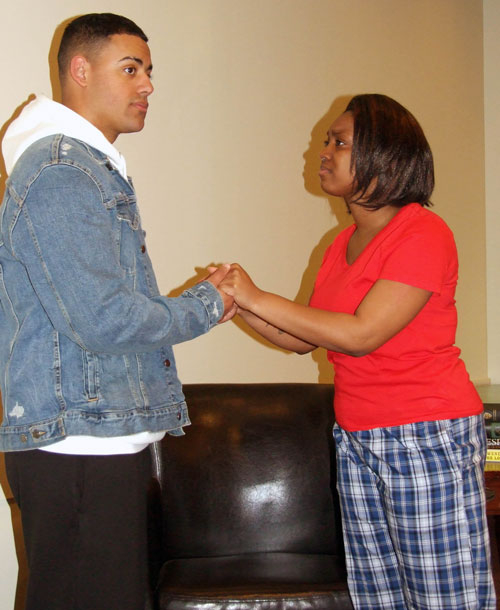
Nya (Margot Mills) is a mother committed steering her son Omari (Aydaen Camilo)
in the right direction in the Department of Theatre and Dance Mainstage Series
production of “Pipeline.”
Photograph retrieved from article by Doug Osborne-Coy on Fredonia.edu.
RAE WIESER
Special to The Leader
“We will die soon.”
The last three words in Gwendolyn Brooks’ poem, “We Real Cool,” are the hardest words to come out in “Pipeline,” written by Dominique Morisseau.
Fredonia Main Stage’s guest director, Yao Kahlil, beautifully brought Dominique’s play to life with a cast of six actors and many people behind the scenes in the technological side of the stage.
Stage manager Lilly Melquist, a second-year senior BA Theater major who has previously worked on “Il Matrimonio Segreto, expressed how working on “Pipeline” was a huge learning experience. This being her second show stage managing in person, she expressed her excitement and confidence after working the opera previously.
The show implemented an interesting twist through engaging the stage crew as a part of the cast. The stage crew was wearing typical black shirts plus black ski masks. Every time they moved sets on and off, they did it in a choreographed manner and even played the ensemble students in certain scenes. It was a unique change that was welcomed.
In regard to the change of working with guest director Kahili, Melquist said, “We as a department are so accustomed to our ways of designing a show. It was refreshing to see the process of doing a show through Yao’s eyes.”
Aside from the technical side of the show, “Pipeline” was a deep message for all individuals watching. “This play was written in 2017, and the Black Lives Matter movement has only grown since then. Plays like ‘Pipeline’ are a way for BIPOC people’s voices to be heard,” said Melquist.
“Pipeline” touches on sensitive details like how young Black men are looked at through a negative and dangerous bias, being seen for their skin color and nothing else. This is shown in the play through Omari’s character. While at his private school, Omari was racially targeted by a teacher and reacted in violence when trying to leave the classroom after being blocked by said teacher.
The show uses Brooks’ poem, “We Real Cool,” on repeat. This is the underlying message of the story. Instead of having the character just read the poem, Nya’s character taught it to her class. Omari’s character walked behind her reading the poem to the tap of his tap shoes echoing in beat with each step he took. It was a beautiful way to go about telling the poem, then repeated in the end with a student speaking it over the loudspeaker as Nya pleaded her case to the school board.
The audience watches the aftermath of Omari’s fight with the character’s interaction between his girlfriend Jasmine, his mother Nya and his father Xavier. We see different reactions from each character as the story progresses.
From being in uniform to their street clothes, the costume changes for Omari and Jasmine show how different they feel from the rest of the school. The characters’ word choices, actions and emotions help sell how the two stick out at their school and truly only find safety in each other.
Watching Nya struggle with the idea of losing her son throughout the show was done slowly and beautifully. “Pipeline” is a call out to the school-to-prison system that Black boys can get trapped in due to a rigged education system. We watch her slowly spiral over the fear of losing her son to the system due to a mistake. The progression of anger building to breaking into fear in front of her son was portrayed excellently due to the passing and watching the lighting and scenery change. Nya’s character is constantly on guard in places she doesn’t feel safe, but when she is home with her son, her guard finally breaks.
The big climax of “Pipeline” is watching Nya’s nervous breakdown. Being dragged into a fight between co-workers over how abused the education system is, Nya enters a pit of panic. We are shown the spiral down by dimming the lights and having the tapping of the tap shoes get faster and louder until it ends with Nya in the hospital.
Then there is the confrontation between Omari and Xavier. We learn the real truth about what made Omari so upset and lash out at his teacher — and it was his father. He expresses how most boys wish they could have their father, claiming it would fix everything, but not Omari. The raw emotion in the scene is held with only the noise of Omari’s words spilling out and a ticking every three seconds. These small yet impactful details helped show the seriousness of the scene and truly make it impactful.
The show was beautifully written and directed. Not once in its almost two-hour run did I get bored or wish there was an intermission. I hope more shows like this will be produced in theater, directed and acted in such a beautiful manner.
